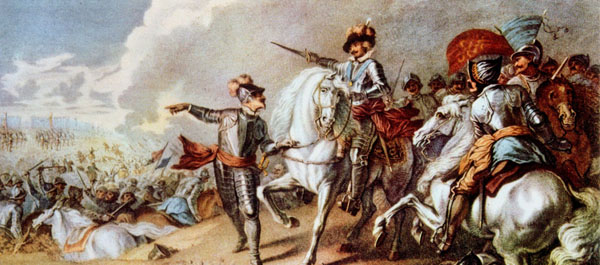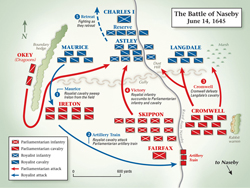
Parliament’s modern army faces off against the Royalists at Naseby in 1645.
This post contains only a snippet of this article. Please purchase the Winter 2010 issue of The Quarterly Journal of Military History to read the entire article.
The English summer of 1645 had been unusually wet, but on June 14 the sky was clear and visibility excellent, making for a dramatic spectacle as two 17th- century armies faced off across a small green rectangle of the English Midlands just outside Naseby, 75 miles northwest of London. Spread along the north side of a large open meadow known as Broadmoor were some 10,000 Royalists loyal to King Charles I, uniformed, a modern historian tells us, in “redcoats, whitecoats, bluecoats, and greencoats, all set out checker-wise, with scores of taffeta colours flaunting in the breeze.” Facing them were nearly 14,000 supporters of Parliament, most clad in red.
Charles I was on the field, as was his field commander and nephew, Prince Rupert of the Rhine, Duke of Bavaria, who had served his uncle continuously since 1642. The 25-year-old soldier was a beau sabreur blessed with good looks, courage, and luck. His martial apprenticeship, covering the gamut of military arts, began when he was 14, and his performance and expertise—not his bloodline—had earned him the rank of commander in chief of the king’s army. This morning, Rupert would have to exploit all his well-honed skills, for he was gambling everything on a powerful strike against the enemy’s left flank and center. If his men succeeded, the king’s cause would be sustained; if they failed, then all might well be lost.
Two of Britain’s preeminent soldiers commanded the forces of Parliament. Capt. Gen. Sir Thomas Fairfax was battle tested, valorous, and strong minded. He had helped organize the army he was leading this day, which represented a radical departure in the nature of a democratic nation’s military—a bold experiment by civilian leaders desperate for victory in this first English Civil War.
 Fairfax’s able lieutenant was Oliver Cromwell, a landed gentleman and member of Parliament who had come into his own as a soldier. On the battlefield, Cromwell was courageous and analytical, with an ability to visualize the ebb and flow of combat, and the skill to grasp momentary openings. A deeply religious man, Cromwell looked to the Almighty for the sanction to wage war, no matter the cost, and likened victory to “nothing but the hand of God.” Cromwell on this particular morning carried the rank of lieutenant general of horse, commanding roughly half of Parliament’s forces in the field.
Fairfax’s able lieutenant was Oliver Cromwell, a landed gentleman and member of Parliament who had come into his own as a soldier. On the battlefield, Cromwell was courageous and analytical, with an ability to visualize the ebb and flow of combat, and the skill to grasp momentary openings. A deeply religious man, Cromwell looked to the Almighty for the sanction to wage war, no matter the cost, and likened victory to “nothing but the hand of God.” Cromwell on this particular morning carried the rank of lieutenant general of horse, commanding roughly half of Parliament’s forces in the field.
Rupert, Fairfax, and Cromwell had already clashed in numerous contests, but on this day, over the next three hours, the fate of England’s fledgling democracy would be determined, and a king’s destiny set on its tragic course in one of the most pivotal battles on English soil.
To view the remainder of this article please purchase the Winter 2010 issue of The Quarterly Journal of Military History.





